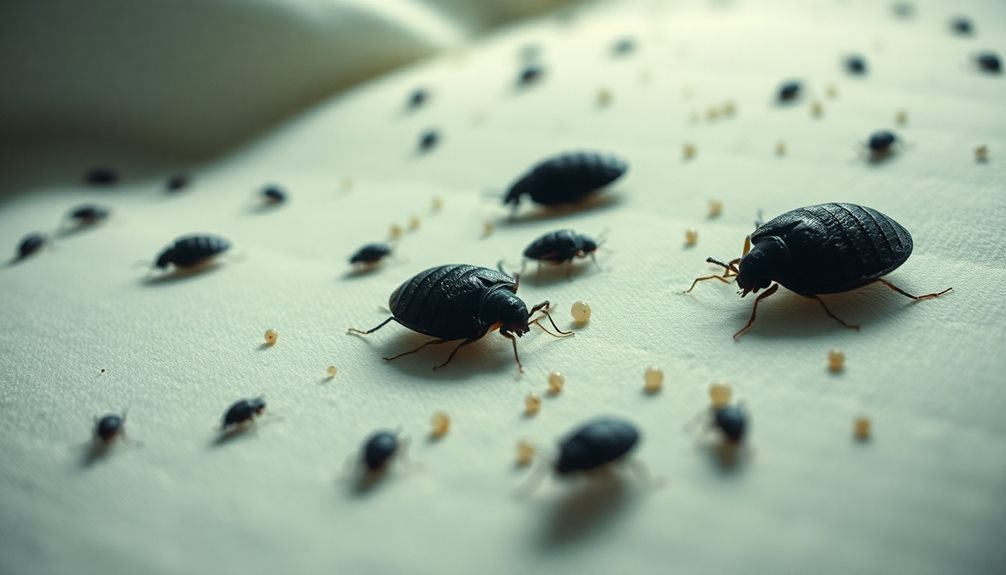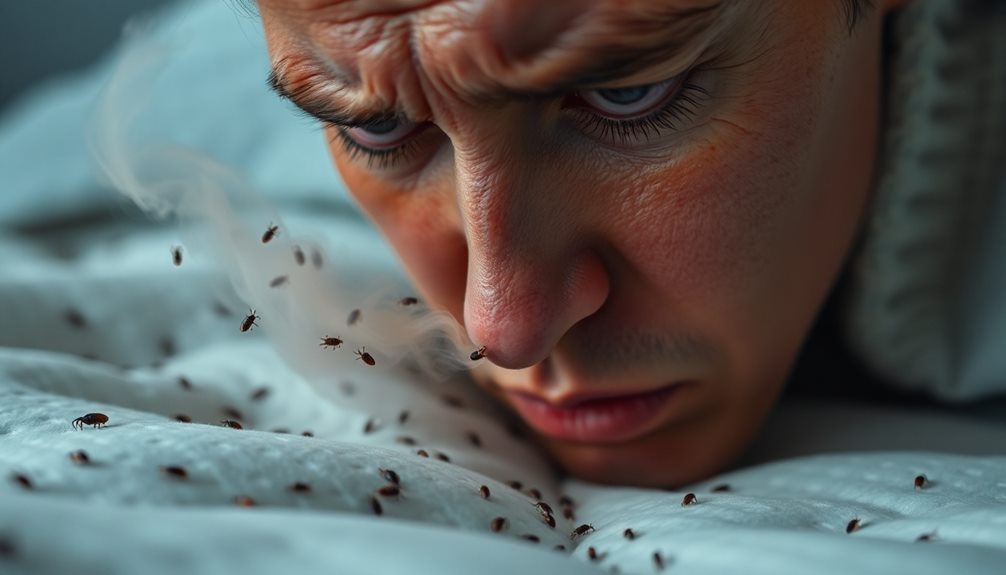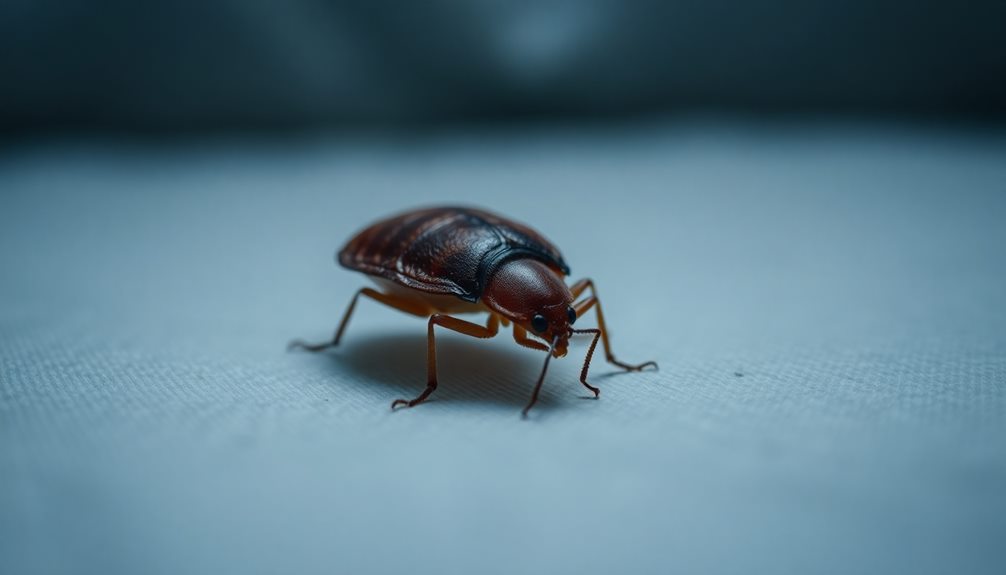If you encounter bed bugs, you might notice a musty odor that resembles overripe fruit or damp, moldy areas. This distinct smell often reminds people of dirty socks or wet towels. It comes from bed bug scent glands releasing pheromones, especially when they feel threatened. The intensity of the odor can increase with the size of the infestation, making it a key sign for detection. Not only can this smell evoke feelings of disgust, but it also serves as an important reminder to act quickly. There's more you can learn about identifying and managing these pests effectively.
Key Takeaways
- The smell of bed bugs is often described as musty or sweet, resembling overripe fruit or damp, moldy environments.
- It can evoke associations with dirty socks or wet towels, intensifying when bed bug hiding spots are disturbed.
- The odor originates from bed bug scent glands releasing pheromones, especially when they feel threatened.
- The composition includes aldehydes, alcohols, and esters, with the scent's strength correlating to the infestation size.
- Recognizing this musty odor is crucial for early detection and preventing larger infestations.
Introduction

Bed bugs, with their elusive nature and nighttime activity, can be quite a nuisance. You might find them hiding in your mattress seams or along baseboards, making it hard to spot them until it's too late.
These tiny pests feed on your blood while you sleep, leaving itchy bites behind. But bed bugs aren't just annoying because of their bites; they can also bring an unpleasant smell into your home. This odor can be indicative of a larger problem, much like how certain household practices can impact your home's air quality and overall environment, such as using an eco-friendly heating solution like a wood stove.
As you begin to suspect a bed bug infestation, you'll likely notice changes in your surroundings. The odor they emit can be a key indicator of their presence.
It's essential to understand that this smell isn't just a minor inconvenience; it can be a signal that something more significant is happening in your living space.
Recognizing this smell can help you take action sooner rather than later. If you can identify it early, you might save yourself from a more extensive and costly infestation.
Description of the Smell

Often described as a musty or sweet odor, the smell associated with bed bugs can be quite distinct. When you encounter it, you might find it reminiscent of overripe fruit or a damp, moldy basement. This odor can be strong enough to linger in the air, making it hard to ignore.
If you've experienced a bed bug infestation, you'll likely remember that pungent scent, which can be unsettling. Regularly maintaining your living space can help reduce odors and improve air quality, making it easier to detect effective air quality improvement when issues arise.
You might notice that the smell intensifies when you disturb bed bug hiding spots, like seams of mattresses or cracks in furniture. It can resemble the scent of certain oils, with a slightly oily or greasy quality. Some people even compare it to the smell of dirty socks or a wet towel left in a corner.
If you're sensitive to smells, you may find this odor particularly offensive. It's essential to pay attention to any unusual scents in your living space, as they could indicate the presence of bed bugs. Recognizing this distinct smell early on can help you take action before an infestation worsens.
Source and Composition

The musty odor associated with bed bugs primarily comes from their scent glands, which release chemicals known as pheromones. These pheromones serve as a form of communication among bed bugs, alerting others to their presence and signaling alarm or mating readiness.
When bed bugs feel threatened or are disturbed, they release a stronger, more pungent scent, which can enhance the musty aroma you might detect. Interestingly, just as certain essential oils, like eucalyptus or tea tree oil, can help with decongestion, understanding the essential oils for sinus congestion relief can provide insights into how various scents impact our environment.
The composition of this odor includes a mix of compounds, including aldehydes, alcohols, and esters. Each of these chemicals contributes to the overall smell. For instance, certain aldehydes are responsible for the distinct musty quality, while other compounds can produce more acrid notes.
It's important to note that the intensity of the smell can vary depending on the size of the infestation. A few bed bugs might produce a faint odor, but a larger population can create an overwhelming stench. This odor is often described as sweet or musty, similar to the smell of moldy shoes or damp towels. In severe cases, the smell can become quite pungent and is typically more noticeable in confined spaces. Unlike *cockroach infestation smell characteristics*, which are generally oily or musty, bed bug odors tend to have that distinct, sweet overnote.
Understanding this source and composition can help you identify a potential infestation early, allowing for more effective control measures. By recognizing these odors, you can take action before the problem escalates.
Typical Scenarios or Environments

Infestations frequently occur in places with high human traffic and close quarters, such as hotels, apartments, and dormitories. These environments provide the perfect breeding ground for bed bugs, as they thrive in areas where people come and go frequently.
If you've ever traveled, you know how easy it's to unknowingly bring these pests home with you. Just one night in an infested hotel room can lead to bed bugs hitching a ride in your luggage or clothing.
Apartments are another hotspot for these pests, especially if your neighbors have an infestation. Bed bugs can easily move through wall voids and shared plumbing, making their way into your living space.
Similarly, college dormitories, with their shared rooms and communal areas, create ideal conditions for bed bugs to spread quickly among students.
You might also find them in public transportation, movie theaters, and offices. While you may not see them, their presence can be detected by the musty odor they emit.
Being aware of these typical environments helps you stay vigilant and take preventive measures to avoid an infestation.
Emotional or Cultural Associations

Experiencing a bed bug infestation can evoke strong emotional responses, from fear and disgust to anxiety and frustration. You might feel overwhelmed by the idea of these pests invading your personal space, disrupting your sense of safety and comfort. The thought of bed bugs crawling on your skin can trigger feelings of revulsion, leading to sleepless nights filled with paranoia.
Culturally, bed bugs carry a stigma that can amplify these emotions. Many societies associate bed bugs with poor hygiene and unkempt living conditions, even though infestations can happen to anyone, regardless of cleanliness. You may fear judgment from others, worrying about how friends or family might perceive your situation. This can lead to isolation as you hesitate to seek help or share your experience.
Furthermore, the smell of bed bugs—a musty, sweet odor—can become a sensory reminder of the infestation, creating lasting associations in your mind. Each whiff may bring back memories of stress and discomfort, reinforcing your anxiety.
Understanding these emotional and cultural associations can help you navigate the experience, allowing you to approach it with a clearer mindset.
Health or Safety Considerations

When dealing with a bed bug infestation, it's crucial to consider the potential health and safety risks involved. While bed bugs aren't known to transmit diseases, their bites can lead to significant discomfort and allergic reactions. You might experience itching, redness, or swelling, which can disrupt your sleep and overall well-being.
Additionally, scratching the bites can lead to secondary infections, putting your skin health at risk. In some cases, people may develop anxiety or insomnia due to the stress of an infestation, impacting your mental health.
Another safety consideration is the use of pesticides. If you choose to tackle the issue yourself, you need to be cautious with chemical treatments. Improper use can expose you and your family to harmful substances. Always follow label instructions and consider hiring a professional exterminator who understands safe practices.
Lastly, remember that a bed bug infestation can spread quickly. If you don't address the problem promptly, it can affect not just your home, but also your relationships with others.
Being proactive about health and safety will help you manage the situation effectively and restore peace in your living space.
Final Thoughts

Addressing a bed bug problem can feel overwhelming, but you're not alone in this battle. Many people face similar challenges, and understanding the signs—like that distinctive, musty smell—can help you take proactive steps. Knowing what bed bugs smell like can assist you in identifying an infestation early, preventing it from escalating into a more significant issue.
Once you've confirmed the presence of bed bugs, it's crucial to act quickly. Don't hesitate to reach out to pest control professionals who've the expertise to handle the situation effectively. They'll not only help eliminate the pests but also guide you on preventative measures to keep them from returning.
Remember, maintaining a clean and clutter-free environment can significantly reduce the chances of a re-infestation. Regular inspections of your living space, especially in areas like your mattress and bed frame, can help you catch any new signs before they become a larger problem.
In the end, staying informed and vigilant is your best defense against bed bugs. Trust your instincts, and don't underestimate the power of an early response. You've got this!
Frequently Asked Questions
Can Bed Bug Smell Be Mistaken for Other Odors?
Yes, bed bug smell can definitely be mistaken for other odors.
You might think it resembles a musty scent or even the smell of mold.
It could also remind you of overripe berries or a damp towel.
Since these odors can be common in various environments, you may not immediately identify them as signs of bed bugs.
It's essential to be aware and investigate further if you notice unusual smells in your living space.
How Can I Eliminate the Smell of Bed Bugs?
To eliminate the smell of bed bugs, you'll need to focus on thorough cleaning and treatment.
Start by washing all bedding and clothing in hot water, then dry on high heat.
Vacuum your mattress, bed frame, and surrounding areas, discarding the vacuum bag immediately.
Consider using a professional pest control service, as they can provide targeted treatments that effectively remove both the pests and their odor.
Regular maintenance can help prevent future infestations.
Does the Smell Change With Different Bed Bug Species?
Different bed bug species can produce varying odors.
While some might emit a sweet, musty scent, others may smell more pungent or sour.
You'll notice that the intensity and type of smell can change depending on the species and the situation, like an infestation or when disturbed.
If you're dealing with a specific species, identifying the scent can help you address the issue more effectively and choose the right elimination strategies.
Can I Detect Bed Bugs by Smell Alone?
You can't rely solely on smell to detect bed bugs, but it can be a helpful clue. If you notice a musty odor, it might indicate their presence.
However, it's best to combine your sense of smell with visual inspections and other detection methods. Look for signs like shed skins or dark spots.
Regular checks and a proactive approach will help you catch any infestations early before they become a bigger problem.
How Long Does the Smell of Bed Bugs Last?
The smell of bed bugs can linger for a while, often lasting several days to weeks after the infestation has been treated.
If you've had an active bed bug problem, you might still notice a faint odor even after extermination.
It's important to air out the space and clean thoroughly to help eliminate the scent.
If the smell persists, you may need to consult a pest control professional for further help.
Conclusion
In conclusion, if you ever catch a whiff of a musty, sweet, or even slightly rotten odor, it could mean bed bugs are nearby. Staying vigilant and recognizing this telltale scent can help you tackle a potential infestation early. Remember, your home should be a safe haven, and knowing what to look for is key. Don't hesitate to seek help if you suspect these unwelcome pests have made themselves at home!









